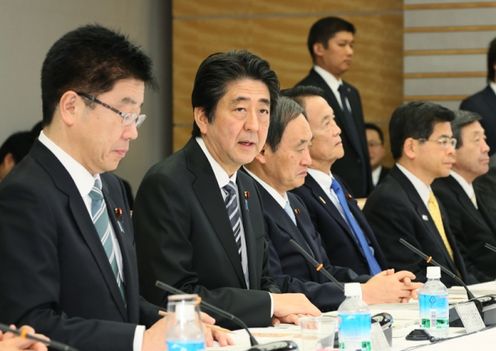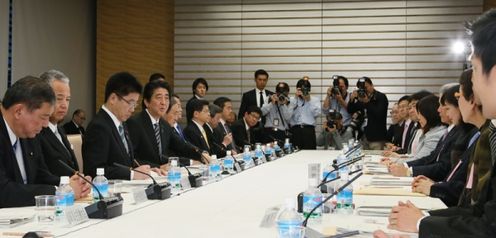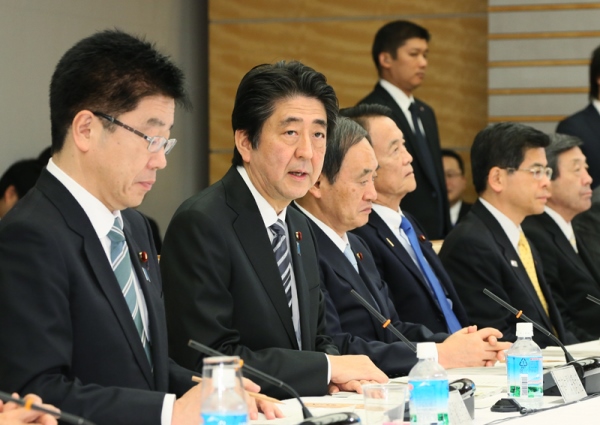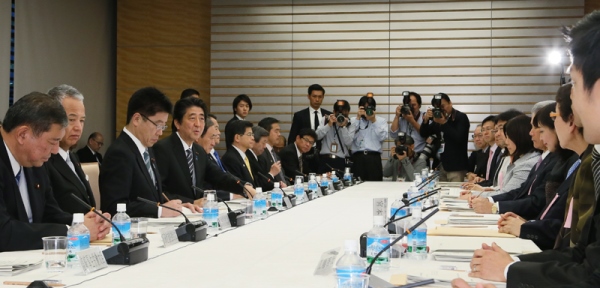Home > News > The Prime Minister in Action > November 2015 > National Council for Promoting the Dynamic Engagement of All Citizens
The Prime Minister in Action
National Council for Promoting the Dynamic Engagement of All Citizens
November 26, 2015

Photograph of the Prime Minister making a statement (1)

Photograph of the Prime Minister making a statement (2)
[Provisional Translation]
Prime Minister Shinzo Abe held the third meeting of the National Council for Promoting the Dynamic Engagement of All Citizens at the Prime Minister’s Office.
During the meeting, discussions took place on the draft of the “Urgent Policies to Realize a Society in Which All Citizens are Dynamically Engaged.”
Based on the discussion, the Prime Minister said,
“Thank you for taking the time to convene for today’s meeting despite your busy schedules.
Today, we compiled the “Urgent Policies to Realize a Society in Which All Citizens are Dynamically Engaged.” We only had a short amount of time to work with, but I believe that speed and momentum are indeed very important when trying to achieve such ambitious and challenging targets. Under such circumstances, all of the experts on the Council contributed greatly toward the compilation of these measures and I am very grateful for your assistance.
In addition, I met personally with people in their 20s to ask about the lessons they learned from the job hunt and the actual conditions they face when trying to balance childcare with work. Yesterday, I spoke with people with experience providing nursing care regarding the actual state of nursing care today. I also visited facilities that provide support to expectant mothers, new mothers and their newborn children, and people requiring nursing care, where I exchanged views with both users and staff.
Through these opportunities, I was reminded anew that now more than ever, we need, above all, to eliminate all the restrictions that are inhibiting people from fulfilling their dreams because of the circumstances they face, so that we can realize a society in which everyone can participate while realizing their dreams, making the most of their abilities, and feeling a sense of fulfillment.
At the most recent APEC meeting I had the opportunity to talk about the rationale behind creating a society in which all one hundred million-plus citizens are each dynamically engaged. The topics of discussion at the APEC meeting were inclusiveness and growth. Many of the countries in attendance showed an interest in Japan’s efforts to address its population problems head on and its new approach to connect childcare and social security with growth. I would like to report to all of you that the rest of the world is deeply interested in the new targets that Japan has set for itself.
If we can realize an inclusive society for all, or in other words a society in which all one hundred million-plus citizens are each dynamically engaged, this will foster a sense of security and make the future more certain, increasing consumption and expanding investment in the process. Furthermore, if we can realize a society that accepts diversity and where each and every person can fully utilize their diverse skills, I believe we will be able to create innovation through new ideas, which will increase productivity and accelerate economic growth.
The three arrows of Abenomics have fostered economic growth. As a result, many private-sector companies have increased their profits, and used these profits to fund capital investment and increase wages. In turn, we have created a positive economic cycle in which consumption is boosted and the economy grows. In the second stage of Abenomics we will reinforce our foundation for childcare and social security, which in turn will further strengthen the economy, thereby helping us to build a positive cycle of growth and distribution. Until now, discussions have tended to focus year in and year out on whether to emphasize growth or distribution, not both. To put an end to such debate, I have proposed that we create a society in which all one hundred million-plus citizens are each dynamically engaged, which in other words is a new socioeconomic system that produces the positive cycle of growth and distribution.
As we begin to see an exit from deflation, it is now precisely the time to take steps to find solutions to the structural problem of a declining birthrate and aging population. These urgent policies represent the first step. The Government will leverage the collective efforts of the Cabinet to immediately begin implementing these urgent policies.
As for the Plan to Realize the Dynamic Engagement of All Citizens, which will be compiled next spring, I hope to integrate individual themes, such as realizing a productivity revolution and reforming the way that people work, as part of the ‘new three arrows,’ and determine how to push forward with economic policies in a broader sense.
As we prepare to formulate this plan, I ask that the experts of the Council proactively discuss and propose ideas for the new socioeconomic system represented by a society in which all one hundred million-plus citizens are each dynamically engaged.
Instead of thinking about each arrow individually, I would like Mr. Kato, as Minister for Promoting Dynamic Engagement of All Citizens, and Mr. Amari, as Minister of State for Economic and Fiscal Policy, to lead efforts to come up with a vision for a comprehensive socioeconomic system. I would also like to request the continued support and assistance of the experts of the Council. Thank you.”


